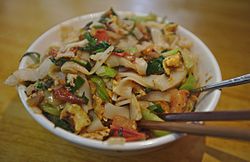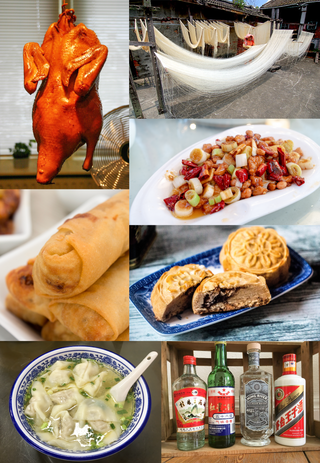
Chinese cuisine encompasses the numerous cuisines originating from China, as well as overseas cuisines created by the Chinese diaspora. Because of the Chinese diaspora and historical power of the country, Chinese cuisine has influenced many other cuisines in Asia and beyond, with modifications made to cater to local palates. Chinese food staples such as rice, soy sauce, noodles, tea, chili oil, and tofu, and utensils such as chopsticks and the wok, can now be found worldwide.

Sichuan cuisine, alternatively romanized as Szechwan cuisine or Szechuan cuisine, is a style of Chinese cuisine originating from Sichuan Province. It has bold flavours, particularly the pungency and spiciness resulting from liberal use of garlic and chili peppers, as well as the unique flavour of Sichuan pepper. Some examples are Kung Pao chicken and Yuxiang shredded pork. There are many local variations within Sichuan Province and the neighbouring Chongqing Municipality, which was part of Sichuan Province until 1997. Four sub-styles of Sichuan cuisine include Chongqing, Chengdu, Zigong and Buddhist vegetarian style.

Pad thai, phat thai, or phad thai, is a stir-fried rice noodle dish commonly served as a street food in Thailand as part of the country's cuisine. It is typically made with rice noodles, shrimp, peanuts, a scrambled egg, and bean sprouts. The ingredients are fried in a wok.

Beef noodle soup is a noodle soup made of stewed or braised beef, beef broth, vegetables and noodles. It exists in various forms throughout East and Southeast Asia.

Misua, also known as wheat vermicelli, is a very thin variety of salted noodles made from wheat flour. It originated in Fujian, China. The noodles differ from mifen and cellophane noodles in that those varieties are made from rice and mung beans, respectively.

Korean–Chinese cuisine, also known as Sino–Korean cuisine, is a hybrid cuisine developed by the ethnic Chinese in Korea.
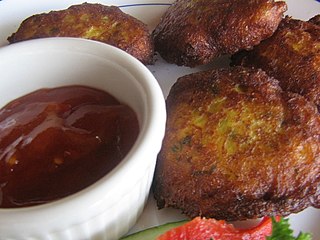
Chili sauce and chili paste are condiments prepared with chili peppers.
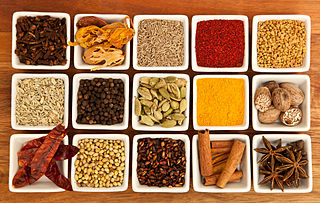
Indian Chinese cuisine, Chinese Indian cuisine, Sino-Indian cuisine, Chindian cuisine, Hakka Chinese or Desi-Chinese cuisine is a distinct fusion culinary style that combines aspects of both Indian and Chinese foods and flavours. Though Asian cuisines have mixed throughout history throughout Asia, the most popular origin story of the fusion food resides with the Chinese of Calcutta, who immigrated to British Raj India looking for work. Opening restaurant businesses in the area, these early Chinese food sellers adapted their culinary styles to suit the tastes of the Indians in order for Chinese food sellers to keep earning money from the Indians.

Japanese Chinese cuisine or Chūka is a style of Japanese cuisine served by Chinese restaurants popularized in Japan in the late 19th century and more recent times. This style of food is different from modern Chinatown Chinese food in Japan which is considered "authentic Chinese food", e.g. Yokohama Chinatown. The Shippoku style of cooking displays heavy influence from Chinese cuisine. Many of these Chinese dishes were introduced to Japan by Chinese immigrants, others were brought in by returning Japanese soldiers from the Japanese invasion and colonization of China.

Hubei cuisine, also known as Chu cuisine or E cuisine, is derived from the native cooking styles of Hubei Province in China.

Bhutanese cuisine employs much red rice, buckwheat, and increasingly maize.
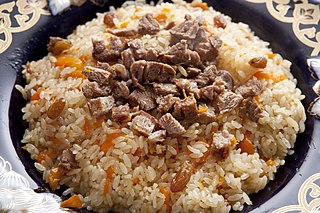
Uyghur cuisine is the cuisine of the Uyghur people, which are mainly situated in the autonomous region of Xinjiang, also commonly referred to as Uyghuristan or East Turkistan.

Mixian is a type of rice noodle from the Yunnan Province, China. It is made from ordinary non-glutinous rice, and it is generally sold fresh rather than dried.

Dapanji or toxu qordiqi, is a type of chicken stew. It is a popular dish that originated in Xinjiang, China.

Malatang is a common type of Chinese street food. It originated in Sichuan, China, but it differs mainly from the Sichuanese version in that the Sichuanese version is more similar to what in northern China would be described as hot pot.
Migan is a type of rice noodle from the Dai people, a Tai cultural group from Yunnan Province, China. It is made from ordinary non-glutinous rice, and it is only sold fresh.

Dandan noodles or dandanmian, literally "carrying-pole noodles", is a noodle dish originating from Chinese Sichuan cuisine. It consists of a spicy sauce usually containing preserved vegetables, chili oil, Sichuan pepper, minced pork, and scallions served over noodles. The dish can either be served dry or as a noodle soup.

Ants climbing a tree is a classic Sichuan dish in Chinese cuisine. The name of the dish in Chinese, Mayishangshu, has been translated as "ants climbing a tree", "ants on the tree", "ants creeping up a tree", "ants climbing a hill" or "ants climbing a log". It is so called because the dish has bits of ground meat clinging to noodles, evoking an image of ants walking on twigs. The dish consists of ground meat, such as pork, cooked in a sauce and poured over bean thread noodles. Other ingredients in the dish may include rice vinegar, soy sauce, vegetable oil, sesame oil, scallions, garlic, ginger, and chili paste.
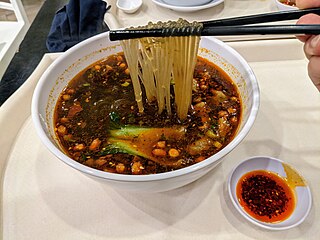
Hot and sour noodles is a dish which comes from Sichuan, China and is a popular part of Sichuan cuisine. The noodles are made from starch derived from peas, potato, sweet potato, or rice.
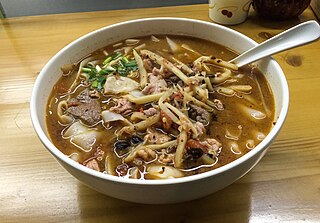
Laoyou rice noodles, which translates as "old friend rice noodles", also referred to as "ol' buddy noodles", is a local noodle dish local to Nanning, China. It is made of fried pepper, sour bamboo shoots, black beans, garlic, pork, soup and rice noodles.
